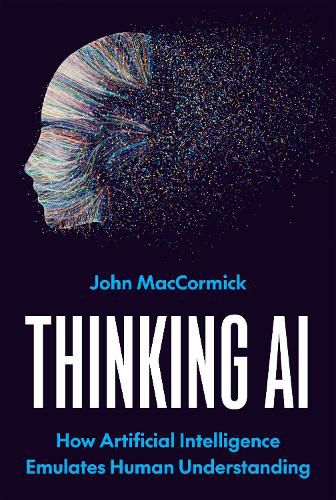Readings Newsletter
Become a Readings Member to make your shopping experience even easier.
Sign in or sign up for free!
You’re not far away from qualifying for FREE standard shipping within Australia
You’ve qualified for FREE standard shipping within Australia
The cart is loading…






Can a computer program think like a human?
"Can machines think?" Ever since Alan Turing posed this question in an influential 1950 paper, it has been central to research in artificial intelligence. More than seventy-five years after Turing's paper, we grapple with it every time we wonder if Watson was actually smarter than Jeopardy! champions, or if ChatGPT really knows what it's talking about. In Thinking AI, computer scientist John MacCormick explores Turing's question from a perspective informed by a detailed understanding of the way modern AI systems work. MacCormick explains, in accessible fashion, the ideas behind the two main pillars of the twenty-first century AI revolution: deep neural networks and reinforcement learning.
MacCormick offers a tour of the most famous AI systems, including AlexNet and VGG16, deep neural networks for object recognition that led to a Nobel prize; DeepMind's AlphaGo, which shocked AI researchers with its superhuman performance in the game of Go; and OpenAI's ChatGPT, which stunned the world with its natural language capabilities. He describes how each system works, and points to parallels with human brain processes. Both human minds and computer programs, MacCormick explains, can induce intelligence through emergence: the capability for new phenomena to emerge from the interactions of many small, simple components. Does this mean that a computer program can think like a human? In many ways, MacCormick argues, the answer is yes. In Thinking AI, he reveals a new landscape of emergent intelligence-a world in which computer programs can emulate many or all aspects of human thinking but humanity retains its meaning and purpose.
$9.00 standard shipping within Australia
FREE standard shipping within Australia for orders over $100.00
Express & International shipping calculated at checkout
Stock availability can be subject to change without notice. We recommend calling the shop or contacting our online team to check availability of low stock items. Please see our Shopping Online page for more details.
Can a computer program think like a human?
"Can machines think?" Ever since Alan Turing posed this question in an influential 1950 paper, it has been central to research in artificial intelligence. More than seventy-five years after Turing's paper, we grapple with it every time we wonder if Watson was actually smarter than Jeopardy! champions, or if ChatGPT really knows what it's talking about. In Thinking AI, computer scientist John MacCormick explores Turing's question from a perspective informed by a detailed understanding of the way modern AI systems work. MacCormick explains, in accessible fashion, the ideas behind the two main pillars of the twenty-first century AI revolution: deep neural networks and reinforcement learning.
MacCormick offers a tour of the most famous AI systems, including AlexNet and VGG16, deep neural networks for object recognition that led to a Nobel prize; DeepMind's AlphaGo, which shocked AI researchers with its superhuman performance in the game of Go; and OpenAI's ChatGPT, which stunned the world with its natural language capabilities. He describes how each system works, and points to parallels with human brain processes. Both human minds and computer programs, MacCormick explains, can induce intelligence through emergence: the capability for new phenomena to emerge from the interactions of many small, simple components. Does this mean that a computer program can think like a human? In many ways, MacCormick argues, the answer is yes. In Thinking AI, he reveals a new landscape of emergent intelligence-a world in which computer programs can emulate many or all aspects of human thinking but humanity retains its meaning and purpose.